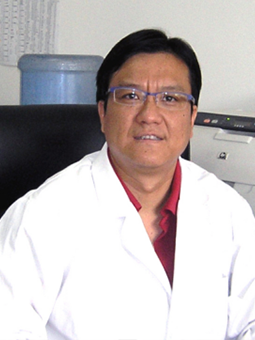
Director and Professor,Department of Cancer Cell Biology
Introduction
Graduated with Bachelor Degree in Physical Chemistry from the Chemistry Department of Tsinghua University and Ph.D. from the Medical School of Turin University, Italy. He is currently vice director of the Tianjin Cancer Institute, director of the Laboratory of Cancer Cell Biology in Tianjin Medical University Cancer Institute and Hospital, director of the Tianjin Key Laboratory for Cancer Prevention and Therapy, and chairman of the Tianjin Medical and Health Key Laboratory Innovation Alliance.
He also serves as Associate Editor of Chinese Journal of Oncology and Board Member of Cancer Biology and Medicine. Following the development of China’s first recombinant protein drug IFNa, he was awarded as a Marie Curie fellow by the European Community in 1992 to conduct biomedical research on interferon in the University of Turin. He was then visiting scientist at the Mario Negri Institute of Pharmacology in Milan, postdoc in National Cancer Institute at Frederick in USA and research scientist in ENH Institute affiliated to Northwestern University, USA.
Since 2003, his research has been focused on a systematic study of molecular transport in cells and its pathological significances in cancer, both in the aspects of disease initial development and those in treatment resistance, proposing a model for high efficient cell signaling which involves and is dependent on a pattern of molecular interaction & transport named “molecular gatheraction”, which is central to better understanding cell biology and may help identifying next generation markers and/or targets for cancer diagnosis and therapy.
Selected Publications
1. Wang Y N , Yao S , Wang C L , et al. Clinical Significance of 4L Lymph Node Dissection in Left Lung Cancer[J]. Journal of clinical oncology, 2018, 36(29):2935.https://ascopubs.org/doi/full/10.1200/JCO.2018.78.7101?url_ver=Z39.88-2003&rfr_id=ori%3Arid%3Acrossref.org&rfr_dat=cr_pub%3Dpubmed
2. Yang H , Liu H , Chen Y , et al. Neoadjuvant Chemoradiotherapy Followed by Surgery Versus Surgery Alone for Locally Advanced Squamous Cell Carcinoma of the Esophagus (NEOCRTEC5010): A Phase III Multicenter, Randomized, Open-Label Clinical Trial[J]. Journal of Clinical Oncology, 2018, 36(27):2796-2803. https://ascopubs.org/doi/full/10.1200/JCO.2018.79.1483?url_ver=Z39.88-2003&rfr_id=ori:rid:crossref.org&rfr_dat=cr_pub%3dpubmed
3. Dongsheng Y, Shidong X , Qun W , et al. Erlotinib versus vinorelbine plus cisplatin as adjuvant therapy in Chinese patients with stage IIIA EGFR mutation-positive non-small-cell lung cancer (EVAN): a randomised, open-label, phase 2 trial[J]. The Lancet Respiratory Medicine, 2018:S2213260018302777. https://www.clinicalkey.com/#!/content/playContent/1-s2.0-S2213260018302777?returnurl=https:%2F%2Flinkinghub.elsevier.com%2Fretrieve%2Fpii%2FS2213260018302777%3Fshowall%3Dtrue&referrer=https:%2F%2Fwww.ncbi.nlm.nih.gov%2F
4. Baohui H, Kai L, Qiming W , et al. Effect of Anlotinib as a Third-Line or Further Treatment on Overall Survival of Patients With Advanced Non–Small Cell Lung Cancer[J]. JAMA Oncology, 2018.https://jamanetwork.com/journals/jamaoncology/fullarticle/2696341
5. Ren W, Ye X , Su H , et al. Genetic landscape of hepatitis B virus-associated diffuse large B-cell lymphoma[J]. Blood, 2018, 131(24):blood-2017-11-817601. https://ashpublications.org/blood/article-lookup/doi/10.1182/blood-2018-12-894097
6. Zhao X , Wang X , Sun W , et al. Precision design of nanomedicines to restore gemcitabine chemosensitivity for personalized pancreatic ductal adenocarcinoma treatment[J]. Biomaterials, 2018, 158:44-55. https://linkinghub.elsevier.com/retrieve/pii/S0142-9612(17)30813-X
7. Sun S , Wu Y , Guo W , et al. STAT3/HOTAIR signaling axis regulates HNSCC growth in an EZH2-dependent manner[J]. Clinical Cancer Research, 2018:clincanres.2248.2016. http://clincancerres.aacrjournals.org/cgi/pmidlookup?view=long&pmid=29540490
8. Cao M Q , You A B , Zhu X D , et al. MIR-182-5p promotes hepatocellular carcinoma progression by repressing FOXO3a[J]. Journal of Hematology & Oncology, 2018, 11(1).https://jhoonline.biomedcentral.com/articles/10.1186/s13045-018-0555-y
9. Wang X , Zhang H , Bai M , et al. Exosomes serve as nanoparticles to deliver anti-miR-214 to reverse chemoresistance to cisplatin in gastric cancer[J]. Molecular Therapy, 2018:S152500161830008X. https://www.sciencedirect.com/science/article/pii/S152500161830008X?via%3Dihub
10. Haiou Y , Haiyang Z , Shaohua G , et al. Exosome-Derived miR-130a Activates Angiogenesis in Gastric Cancer by Targeting C-MYB in Vascular Endothelial Cells[J]. Molecular Therapy, 2018:S1525001618303708. https://www.sciencedirect.com/science/article/pii/S1525001618303708?via%3Dihub